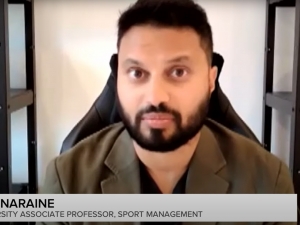Brock University Professor of Kinesiology Stephen Cheung has written a piece recently published in PEZ Cycling News about how serious cyclists can deal with extreme summer heat and the impact those conditions have on performance. Cheung was an invited speaker at the Science and Cycling conference in Nantes, France just prior to the start of the Tour de France earlier this month, where he spoke about the impact of heat on exercise capacity and the current knowledge about how to adapt to hot weather.
Cheung writes:
First off, heat absolutely does impair exercise, and at much lower temperature than we may think. A nice analysis of multiple marathons across a range of location and years showed that, even a wet-bulb globe temperature (WBGT) of 15°C impaired marathon times compared to 10°C (Ely et al. 2007). This supported a 1997 study from my post-doc lab demonstrating that time to exhaustion was maximized at 10°C compared to 0 or 20°C, with a further impairment at 30°C (Galloway and Maughan 1997).
The 2007 study also showed that the less fit you were, the greater the impact of heat on performance capacity.
How big a decrement does this work out to in real-life cycling? A study in 2015 had Danish cyclists perform a 43.4 km outdoor TT in 5°C temperature, where they averaged ~300 W. These cyclists then went to a 2-week training/heat adaptation camp in Qatar. The day after arrival, they performed another 43.4 km outdoor TT and averaged a 15% decrease in average power (Karlsen et al. 2015).
If heat is indeed bad for performance, what can we do about it? While there are many day-of options such as pre-cooling, ice slurry ingestion, etc., the best way to prepare is by a gradual physiological adaptation to exercise in the heat.
Read the full article here.









